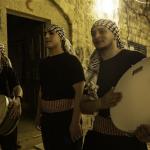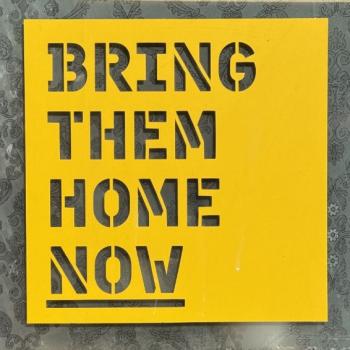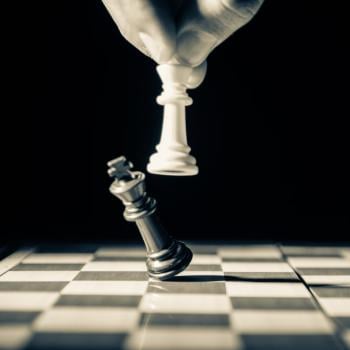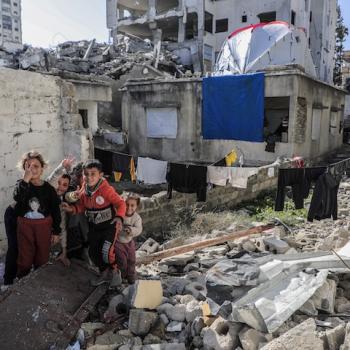Dear friends, I have a very special Ramadan story for you today. If you’ve been reading my blog, you know that my husband was born in the Gaza Strip, and my full-time gig is researching and writing about the Israel/Palestine issue. I’ve written about the subject several times on Patheos (for example, here, here, and here).
About a year ago, I received a Facebook message from someone in Gaza claiming to be a relative. Sure enough, it was the granddaughter of my husband’s aunt. We were thrilled to find Hanin (ha-NEEN), and since then we’ve had many long video chats with her and her family – including Aunt Zahiyyah (za-HEE-uh), who is 94!
Hanin and I text back and forth all the time, and we’ve gotten quite close. I feel very blessed that she is part of my life. She is a strong, brave young woman.
I heard that Israel dropped bombs on Gaza overnight (Thursday night/Friday morning), so I asked her whether everyone was ok. She told me that the airstrikes happened just as all of Gaza was eating suhoor (the meal just before the fast starts).
This was no coincidence. Israel’s politicians know that if they interrupt suhoor, Gazans will start the fast without the usual meal, and be extra hungry and miserable all the next day.
Then Hanin told me (using Google Translate):
It is an evil deed that is not new to them, I remember in 2014 the war broke out in Ramadan…we were in constant fear and anxiety, I was always afraid of losing someone from my family.
Listen carefully to this next sentence – something that no 24-year-old should ever have to say:
It was one of the most difficult wars I’ve lived through.
Think about that, please. A young woman who has lived through so many wars that she is able to rank them.
Shame on the United States for subsidizing this inhumane treatment – we send Israel over $10 million a day in military aid to do this. Shame on those Christians who support Israel.
In the spirit of Ramadan education for followers of Jesus, I asked Hanin to tell us a little about the war that Israel started during the month of Ramadan in 2014. I hope you’ll read her story and never forget it. (Below her story, I’ll provide links for further reading about the issue, and an email address where I invite you to send questions.)
She writes:
My name is Hanin, I live in the Gaza Strip, I am 24 years old. I will tell you my story of Ramadan 2014. It is a sad story, but it taught me a lot of courage and strength. I was seventeen years old, we were in the month of July and fasted for 16 hours a day, and it was very hot on the 11th of Ramadan, that is, on July 8, 2014, the day the war began. At times, the sound of shelling was constant. We lived in constant anxiety, afraid to lose a family member.
We had electricity just four hours a day, so we lived in two kinds of darkness: the darkness of no electricity and the darkness of war. After a terrifying night, when it was almost dawn and time for suhoor, we would search for a candle to light our small meal. At iftar (breaking the fast), we lit another candle.
Iftar is supposed to be joyful, but we did not feel joy because of the continual bombing. It was violent and terrifying, and the children were always anxious and afraid [Hanin is the oldest of eight children, and was 17 at the time].
We would sit and listen to the radio to hear the news of the latest bombing, and say, “Lord protect us.” We would sit in one room together and say, “If we die, let us die together.”
I remember getting sick during the war. I had a fever for 3 days, so my mother decided to take me by car to the hospital. The [Israeli] planes were bombing any car they saw, even with civilians, and I was afraid that the planes would bomb us. When I got to the hospital, I said, “Praise be to God, I am still alive.” The doctor prescribed medicine for me.
But then we had to drive home, and I was afraid we would die before we got home. We made it, but the next day, the hospital was bombed. Thank God it happened after we left.
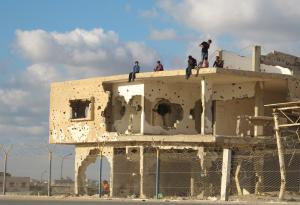
The occupation did not leave anything alone: they bombed mosques, hospitals, ambulances, journalists. It was a difficult and painful time with many massacres, including children, women and the elderly. Many houses near us were bombed.
The prices of goods were rising and rising, and the whole family [10 people in the household] used to share one plate of food to break our fast, and we would thank God that we found food for another day.
These days were terrifying, painful, and sad. I was yearning for Eid [the celebration after completing the Ramadan month of fasting]. I wished that the war would stop a little and Eid would come – but the war kept going, burning and killing many lives in every moment.
My younger brother and sisters were terrified. I always told them, “You should not be afraid, you must be strong. The war will end and everything will be fine.”
Eid finally came, but it was very sad. Everyone grieved for those who had died. I wished for the violent sounds to stop for a while; I closed my ears so that I could not hear them, but my feet could feel the vibrations from the bombs hitting the ground.
My mother was nine months pregnant, waiting for a new baby to come. The first thing the baby heard would be the sound of the bombing. My mother felt the pains of labor, and we called the ambulance to take my mother to the hospital. On August 24, 2014, my little brother came into the world, and indeed, the first thing that this little boy heard was the sound of bombing.
Two days after his birth, the war stopped at last, after 52 days of torment, pain, and loss. The news of the end of the war was the most beautiful news I ever heard.
I tried to convince myself that I should forget this pain I had lived through. I was about to enter my last year of high school, and I had to prove that I can succeed despite all the difficult circumstances.
I had a classmate who was traumatized by the war. She lived in an area that was severely bombed, and suffered psychological damage. She didn’t recognize her father, and she told him, “you are not my father, my father died.” I stayed with her and told her to forget the past with all its pain. I reminded her that a wonderful future awaits us. She got better after a while, and we graduated from high school with honors.
After the war ended, I tried to help my brother and sisters relax. For a whole week, every day I took them to the park near us. I asked them to paint, to think about the future.
I may feel fear, sadness and anxiety sometimes, but I still hold on and stay strong, because life requires us to do so. I can share my feelings with my father – he gives me a lot of strength and always encourages me, so I do not give up in front of the battlefield of life.
Today, Hanin’s life is better – because she is tenacious and optimistic, not because Israel stopped dropping bombs. on Gaza or making life hell. She wishes all my readers “Ramadan Kareem”!
I’m so very proud of her.
(Since my Comment section is not working right now, if you have comments about this topic, feel free to drop me an email at [email protected]. I will write about Palestine again, and I’d love to answer any questions I can!)
Some suggested articles for learning more about Gaza and the Israel/Palestine issue:
Easter for us, but Palestinians are still in Gethsemane
Even with ICC investigation looming, Israel refuses to behave itself
Israel’s Covid response is a “moral failure” – WHO
Explainer video (8 min.) on “rockets from Gaza”
The bizarre case of Mohammad El-Halabi displays Israeli “justice”
American Zionists choose lies over children
In Israel, religious extremism is pervasive, unchecked
Israel’s obscene mismanagement of the Covid-19 vaccine
What does the Bible really say about modern Israel?
FEATURED IMAGE: “Life in Gaza” by United Nations Photo is licensed under CC BY-NC-ND 2.0



